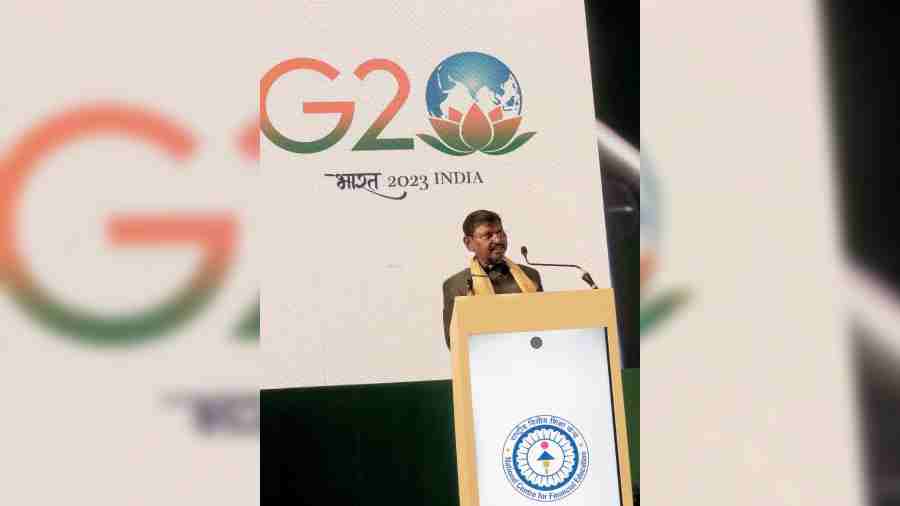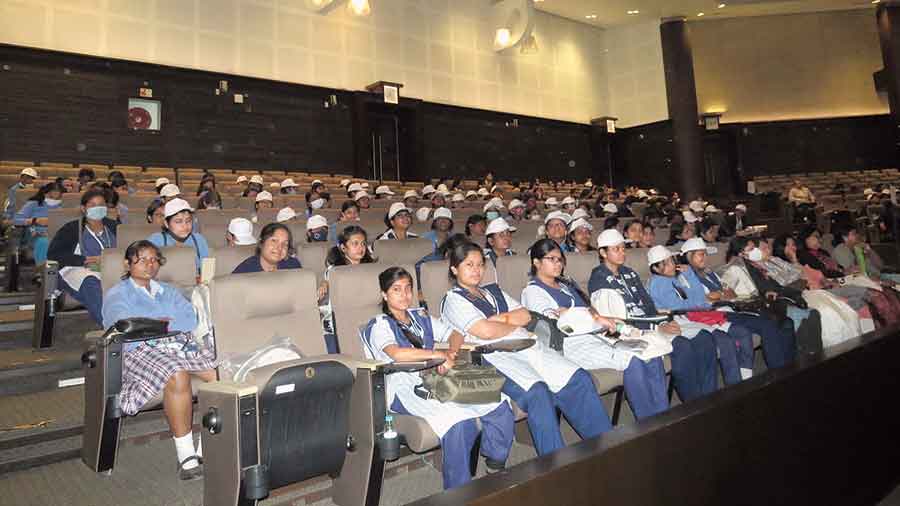Students of the township, along with the rest of West Bengal, will soon receive training in financial literacy in school. The state government is set to implement a programme in which students will be taught the basics of banking transactions and money management.
"We need to impart training to students. Last year, the Reserve Bank of India (RBI) came up with a financial literacy curriculum which the education department of the state government is on the verge of implementing under the Ananda Parishar programme," said Manas Dhar, special secretary of the finance department.
Dhar was speaking at a programme on financial education for students of classes IX to XII, organised by the National Bank for Agricultural and Rural Development (Nabard) in coordination with National Centre for Financial Education. The programme was being held at the Biswa Bangla Convention Centre as part of the G20 summit on January 10.
Ananda Parishar, Dhar explained, is a "non-assessment class held on Saturdays, along with other soft skill classes, without obligation to score marks”.
It was initiated on the basis of a directive from the Paschim Banga Samagra Shiksha Mission on October 15 to the presidents of the state secondary and higher secondary councils. It is an informal interaction between the teacher and students with a range of activities suggested to enhance soft skills - from drawing, painting, singing and drama to planting of saplings. The objective is to boost confidence and communication skills.
Local schools have already started taking Ananda Parishar classes. “The period is meant for lessons of life outside the syllabus that students will need to be worthy citizens. Though currently cultural activities are happening, we plan to add other things too as teachers of various subjects take the class by rotation. The political science teacher, for instance, can teach them about the workings of the Parliament. It would be useful if a curriculum on banking is also introduced,” said S.M. Reyaz Ahmed, headmaster of Bidhannagar Government Higher Secondary School.

Minister Arjun Munda at the G20 event
As per the United Nations, financial inclusion is a critical enabler to achieve eight of the 17 Sustainable Development Goals (SDGs) of the United Nations. Financial inclusion and financial literacy issues have been identified as the flagship priority of the Indian G20 Presidency.Financial Inclusion is the process of offering banking and financial services to individuals. It aims to include everybody in society by giving them basic financial services regardless of their level of income or savings.
“We have brought 1,800 students from 21 schools from across Bengal to attend this programme. They are a mix of state board, ICSE and CBSE schools. We need to make every child understand what a bank account is, what insurance is,... Our task is incomplete till every child is financially literate. Reserve Bank of India has taken steps in this regard, so have we,” said Usha Ramesh, chief general manager, Nabard, West Bengal region. A Financial Inclusion Index, she said, has been prepared weighing the different districts of West Bengal on parameters like availability, outreach, banking penetration, usage and deepening. “Going forward, we will focus on development programmes in whichever district the index is low,” she added.
“The state government has asked bankers to visit schools and colleges, and open accounts of students to give them a taste of banking and enble them to get direct benefits from the schemes of the state and the central governments,” Dhar said. He specifically mentioned how the Kanyashree project for girl students in Bengal has effected a large reduction in school dropout numbers for girl students.
“We are in an era when we use the internet for digital transactions over the bank's website. Pass on the knowledge, not the password. Teach others in your family. Talk to those who come to work in your house. You are our ambassadors to educate them,” R. Kesavan, regional director of RBI, told the students.
Union minister of tribal affairs Arjun Munda switched to Bengali to catch the attention of students who had come mostly from the districts. “The economy is like the human body and money is like blood that needs to stay in circulation to keep the organs running. If there is less or more supply at any point, it is a problem. If blood leaks, doctors step in on emergency basis. Similarly resources must not be wasted and all government organizations are tasked to stop the leakage,” Munda explained.
Students had come from schools as far off as Panskura and Kharagpur, with Dum Dum Road Government Sponsored High School for Girls being the closest to the venue. It was a first visit to New Town for almost all of them and they were left wide-eyed by both the convention centre and the township.
